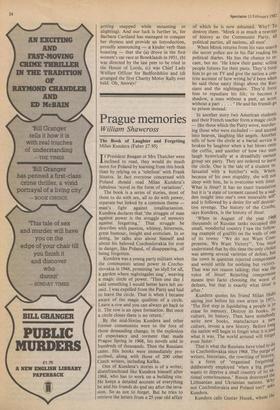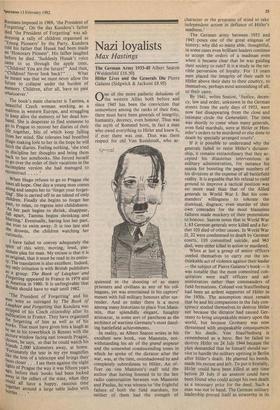Prague memories
William Shawcross
The Book of Laughter and Forgetting Milan Kundera (Faber £7.95)
T f President Reagan or Mrs Thatcher were
inclined to read, they would do much more for Poland by learning from this book than by relying on a 'telethon' with Frank Sinatra. In fact everyone concerned with Poland should read Milan Kundera's fabulous 'novel in the form of variations'.
The book is a series of stories, most of them to do with sex, all to do with power, separate but linked by a common theme - man's fight against totalitarianism.
Kundera declares that 'the struggle of man against power is the struggle of memory against forgetting.' That struggle he describes with passion, whimsy, bitterness, great humour, insight and eroticism. In so doing, he talks also about himself and about his beloved Czechoslovakia for ever in danger, like Poland, of disappearing, of being forgotten.
Kundera was a young party militant when the communists seized power in Czecho- slovakia in 1948, promising 'an idyll for all, a garden where nightingales sing', weaving a magic circle of power. 'Then one day I said something I would better have left un- said. I was expelled from the Party and had to leave the circle. That is when I became aware of the magic qualities of a circle. Leave a row and you can always go back to it. The row is an open formation. But once a circle closes there is no return.'
By the mid-Sixties Kundera and other former communists were to the fore of those demanding change; in the explosion of expectancy and torment that made Prague Spring in 1968, his novels sold in hundreds of thousands. Then the Russians came. His books were immediately pro- scribed, along with those of 200 other Czech writers, including Kafka.
One of Kundera's stories is of a writer, disenfranchised like Kundera himself after 1968, who has to work on a building site. He keeps a detailed account of everything he and his friends do and say after the inva- sion. So as not to forget. But he tries to retrieve the letters from a 25 year old affair of which he is now ashamed. Why? To destroy them. `Mirek is as much a rewriter of history as the Communist. Party, all political parties, all nations, all men'.
When Mirek returns from his vain search the secret police are in his flat reading his political diaries. He has the chance to re- cant, but no. 'He knew their game: selling people futures for their pasts. They'd force him to go on TV and give the nation a con-
trite account of how wrong he'd been when he said those nasty things about the Rus-
sians and the nightingales. They'd force him to repudiate his life; to become a shadow, a man without a past, an actor without a part . . . . ' He and his friends go to prison instead.
In another story two American students and their French teacher form a magic circle — like those which the Party wove, murder- ing those who were excluded — and ascend into heaven, laughing like angels. Another tells of how the circle at a burial service is broken by laughter when a hat blows onto the coffin, and another of how two men laugh hysterically at a dreadfully earnest group sex party. They are ordered to leave the circle. One is the tale of a student in- fatuated with a butcher's wife. When, because of his own stupidity, she will not sleep with him, he is overcome with litost. What is litost? It has no exact translation but it is 'a state of torment caused by a sud- den insight into one's own miserable self' and is followed by a desire for self destruc- tive revenge. The history of the Czechs, says Kundera, is the history of tiros/. `When in August of the year 1968 thousands of Russian tanks occupied this small, wonderful country I saw the follow- ing example of graffiti on the walls of one of its towns: "We do not Want Com- promise, We Want Victory". You must understand that by this time the only choice was among several varieties of defeat, but the town in question rejected compromise and would settle for nothing but victory.- That was not reason talking; that was the voice of Most! Rejecting compromise means ipso facto choosing the worst of defeats, but that is exactly what litost is after.' Kundera quotes his friend Milan Hub' saying just before his own arrest in 1971, 'The first step in liquidating a people is to erase its memory. Destroy its books, its culture, its history. Then have somebody write new books, manufacture a new culture, invent a new history. Before long the nation will begin to forget what it is and what it was. The world around will forget even faster.' That is what the Russians have tried to ctn. to Czechoslovakia since 1968. The purge of writers, historians, the rewriting of history is a form of 'organised forgetting deliberately employed 'when a big power wants to deprive a small country of its na- tional consciousness.' Russia destroyed the Lithuanian and Ukrainian nations. Wily not Czechoslovakia and Poland too?' asks Kundera.
Kundera calls Gustav Husak, whom the Russians imposed in 1969, 'the President of Forgetting'. On the day Kundera's father died 'the President of Forgetting' was ad- dressing a rally of children organised as 'Young Pioneers' by the Party. Kundera told his father that Husak had been made an 'Honorary Pioneer' . His father laughed before he died. 'Suddenly Husak's voice Came to us through the apple trees. "Children! You are the future!" And then, "Children! Never look back!" . . . What he meant was that we must never allow the future to collapse under the burden of memory. Children, after all, have no past whatsoever.'
The book's main character is Tamina, a beautiful Czech woman working as a Waitress in western Europe, and struggling to keep alive the memory of her dead hus- band. She is desperate to find someone to go to Prague to recover her diaries of their life together, bits of which keep falling from her mind. She tolerates bad breathed Hugo making love to her in the hope he will fetch the diaries. Feeling nothing, 'she tried to discipline her thoughts and bring them back to her notebooks. She forced herself .1° go over the order of their vacations in the incomplete version she had managed to reconstruct . . • • When Hugo refuses to go to Prague she loses all hope. One day a young man comes along and tempts her to 'forget your forget- ting'. She is carried off to an island of only children. Finally she begins to forget her Past, to relax, to regress into childishness. 'As her past begins to shrink, disappear, fall apart, Tamina begins shrinking and blurring,' Eventually, having lost her past, she tries to swim away. It is too late and she drowns, the children watching her curiously.
I have failed to convey adequately the spirit of this witty, moving, lewd, pas- sionate plea for man. My excuse is that it is 8° original, that it must be read in its entire- ty The translation is also excellent. Indeed, 11.1Y only irritation is with British publishers as a group. The Book of Laughter and „, orgetting appeared in France in 1979 and 1.,n America in 1980. It is unforgivable that °ritairi should have to wait until 1982.
:The President of Forgetting' and his
en were so outraged by The Book of saughter and Forgetting that Kundera was stripped of his Czech citizenship after its Publication in France. They have organised the forgetting of him as well as of his ,Works. That must have given him a laugh as he sat in his towerblock in Rennes with the Picture window facing east towards Prague, chaser, he says, so that he could watch his friends 2,000 kilometers away, at home.
like the the tear in my eye magnifies the lens of a telescope and brings their !aces closer . . . I see them against the night nghts of Prague the way it was fifteen years 4go, before their books had been locked away in the cellars of the state, when they _°uld all have a happy, raucous time ,`
bottles around a large table laden with °ottles











































 Previous page
Previous page